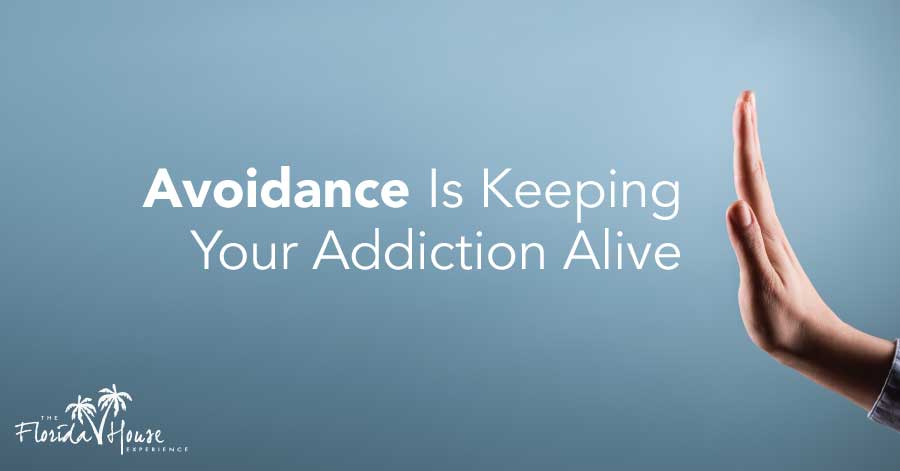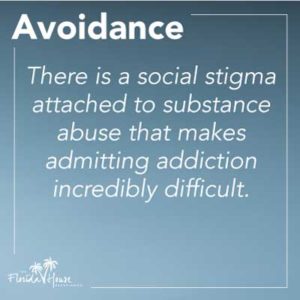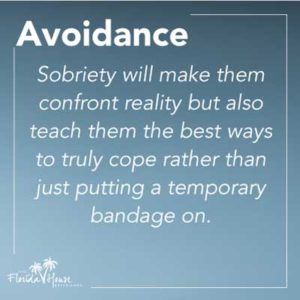
Avoidance in relation to substance addiction is simply the refusal that there is an issue. Often times, addicts are in denial that they are abusing drugs and/or alcohol to get through their daily lives. There is a social stigma attached to substance abuse that makes admitting addiction incredibly difficult. Addicts do not want to admit that their entire lives have been impacted, from their health to career to relationships. Doing so would also require acknowledging the damage that has already been done. In addition, confessing to having a problem is the first step in treatment. People are hesitant to get professional help, they do not want to share their disease in therapy or meet others in similar situations to them. This can be a major reality check and so it is understandable why many individuals would take a while in admitting an addiction.
How Is Avoidance Dangerous?
 Avoidance is dangerous because the longer an addiction is sustained, the harder it is to quit and the more damage it does to mental and physical health. Alcohol can deteriorate the body’s liver and pancreas, while also increasing the chance of heart disease and risk of diabetes. An alcoholic can find himself or herself driving while under the influence, posing a huge threat to other innocent individuals in the event of a crash or accident, which can be disastrous. They may find themselves drinking while at work, losing out on promotions due to an inability to complete tasks and the disease may even cost them their entire career.
Avoidance is dangerous because the longer an addiction is sustained, the harder it is to quit and the more damage it does to mental and physical health. Alcohol can deteriorate the body’s liver and pancreas, while also increasing the chance of heart disease and risk of diabetes. An alcoholic can find himself or herself driving while under the influence, posing a huge threat to other innocent individuals in the event of a crash or accident, which can be disastrous. They may find themselves drinking while at work, losing out on promotions due to an inability to complete tasks and the disease may even cost them their entire career.
Most drugs are not legalized for recreational use and having them in possession is already a violation of law that could result in jail time. One sign of prolonged use is a lack of care for safety, as the lust for drugs becomes stronger over time and logic is thrown out during periods of craving. Someone abusing intravenous drugs, for example, may become reckless with where they are obtaining needles or who they are injecting substances with. This can spread diseases and infections that could be incurable. Addiction takes away one’s care for themselves and others. Indulging in one irresponsible act usually leads to other unhealthy behaviors, such as promiscuity or engaging in fights while high. A woman addicted to drugs and/or alcohol might not even be able to quit during pregnancy. Her baby could become dependent on the same substance as it is transported in the bloodstream or may be born with a disability. Continued addiction has ramifications which can be avoided with acknowledging that is an issue and having it addressed.
Admitting an addiction is a tremendous undertaking because of the nature of addiction. Addiction is all about escapism. Users often start abusing because they are escaping reality. Some are trying to deal with depression or anxiety, others may be self-medicating due to sleep issue or are attempting to achieve rapid weight loss. Some want to forget about the chronic pain that has been afflicting them for years. Confessing to an addiction will make an addict have to face the realities they have been running from in some cases all their lives. It is important to note that drugs and alcohol are so enticing because they produce a high, a sense of euphoria or pleasure that takes one away from their bleaker environment or situation.
Reality can be too painful for an addict. There are some people for whom addiction began as a way to cope with death or an immense loss. Admitting addiction, seeking treatment, and getting sober would force them to accept that the person is truly gone. This is why they prefer the alternative of being oblivious. Addicts, like all human beings, tend to avoid pain and indulge in pleasure. Intoxication comes with the bliss, which contrasts to the mundane and sometimes insufferable nature of daily life. However, users must know that treating their trauma by getting high is a short-term fix for problems that can lead to major health implications. Sobriety will make them confront reality but also teach them the best ways to truly cope rather than just putting a temporary bandage on.
Admitting Your Addiction
 Addiction is a phenomenon that not only involves users but also their friends, family, co-workers, and loved ones. Drug abuse affects millions of people every single year. In 2010, over 210 million Americans filled their opiate prescriptions. Heroin use in the country has continued to rise annually. An estimated seven hundred thousand individuals used the drug last year in the nation. Alcoholism is increasingly prevalent in the United States as well. One in twelve adults suffers from alcohol addiction. Millions more have dangerous drinking habits but do not fit the set criteria for addiction. Clearly many people need immediate substance abuse treatment, such as the various types offered by FHE Health at our numerous recovery centers. We promise full confidentiality to our patients, interviewing them on a case by case basis to help identify the affliction, call it by its name, and then design a personalized course of treatment. We pride ourselves on being highly successful at helping people to admit their addiction, break the pattern of abuse, repair the damage caused by drugs and alcohol, and go on to live a happy life.
Addiction is a phenomenon that not only involves users but also their friends, family, co-workers, and loved ones. Drug abuse affects millions of people every single year. In 2010, over 210 million Americans filled their opiate prescriptions. Heroin use in the country has continued to rise annually. An estimated seven hundred thousand individuals used the drug last year in the nation. Alcoholism is increasingly prevalent in the United States as well. One in twelve adults suffers from alcohol addiction. Millions more have dangerous drinking habits but do not fit the set criteria for addiction. Clearly many people need immediate substance abuse treatment, such as the various types offered by FHE Health at our numerous recovery centers. We promise full confidentiality to our patients, interviewing them on a case by case basis to help identify the affliction, call it by its name, and then design a personalized course of treatment. We pride ourselves on being highly successful at helping people to admit their addiction, break the pattern of abuse, repair the damage caused by drugs and alcohol, and go on to live a happy life.
Because alcohol consumption is so mainstream in our culture, many are unaware of the toll it can take on health, professional lives, and relationships. The side effects of alcohol detoxification treatment, a service offered by Florida House, are noteworthy because the withdrawals of alcohol can be deadly if undertaken without professional aid at a treatment facility. It is not a matter to be taken lightly. While drugs are not so widespread and public, the stigma of abusing them keeps many people from getting treatment. The first step to sobriety is to admit your addiction, and Florida House has a list of symptoms of addictions. If they apply to you, please reach out:
- The inability to stop using drugs or alcohol, despite attempting
- Withdrawal symptoms when you attempt to stop using substances
- Spending an increased about of time alone
- Losing interests in hobbies or things that were previously enjoyable
- Experiencing drastic changes in sleeping patterns and ability to rest
- Neglecting one’s own personal hygiene
- Experiences changes in eating and appetite
- Having mood swings or rapid emotional changes
- Dealing with cravings or urges for drugs or alcohol
- Having anxiety, depression, paranoia, and panic
- Having nausea, vomiting, nightmares, confusion, and fever
- Continuing to use substances over extended periods of time
- Completing school, home, or work obligations are challenging
- Using substances even while doing other things, like driving or working
- Spending a lot of time recovering from substance use
- Being incapable of suppressing or controlling urges
Contact Florida House
If you or someone you know needs help admitting an addiction, contact us at 833-596-3502 for assistance on how to reach out to them or get counseling yourself. Our team of highly trained and compassionate medical specialists, counselors, and experts can assist you in understanding addiction and avoidance. There is always hope for recovery and it is never too late to seek help.






